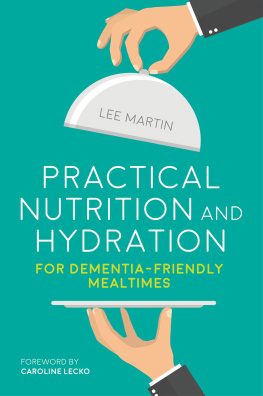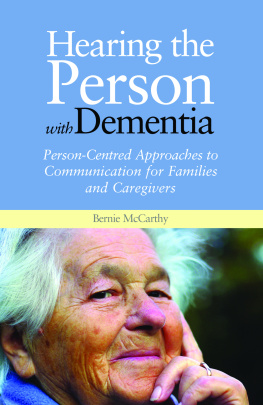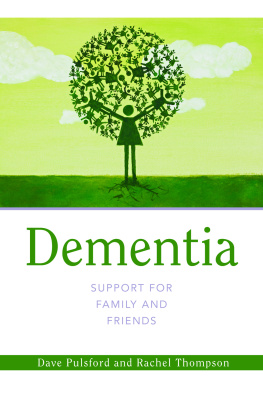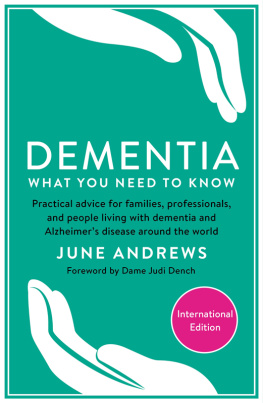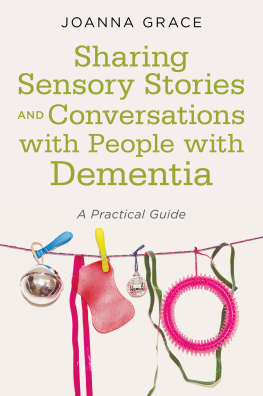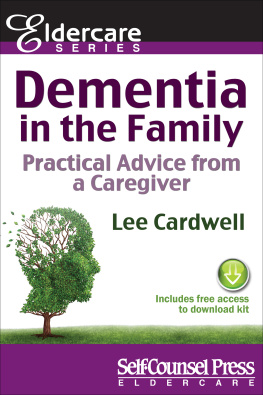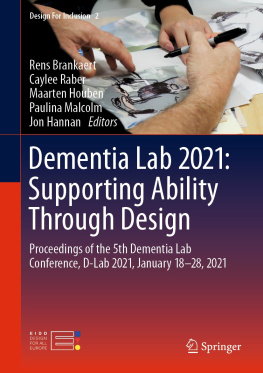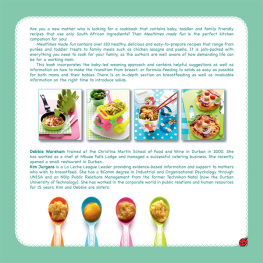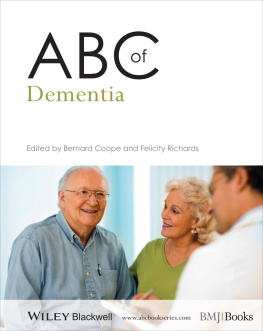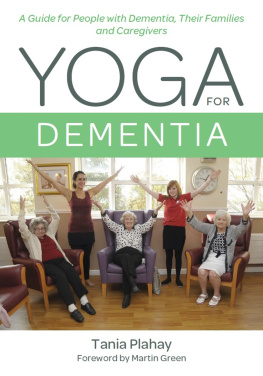
Practical Nutrition
and Hydration for
Dementia-Friendly
Mealtimes
LEE MARTIN
Foreword by Caroline Lecko

Jessica Kingsley Publishers
London and Philadelphia
Contents
Foreword
It is with great pleasure that I pen the foreword for this book, having experienced caring for a family member with dementia and so clearly remembering how difficult mealtimes become as our dementia journey progressed.
Despite my many years of experience as a nurse I did not feel equipped to support my relative with dementia or my family to provide the nutritional care that was needed as we faced behavioural changes, food preference changes and latterly swallowing difficulties challenges that I now know so many families and carers struggle with. The challenges that we faced were not just around our own lack of knowledge and experience in caring for a person with dementia, but also with the amazing care staff who really struggled to cope at mealtimes with people with dementia.
The chapters within this book provide much-needed practical solutions to improve the mealtime experience, nutrition and hydration for people living with dementia. Key to this is using the Dementia Mealtime Assessment Tool as a resource for assessing and monitoring mealtimes, and the evidence-based interventions will provide you with a range of tools to help you in providing person-centred care to support mealtimes for people with advancing dementia.
I believe that we all take the ability to eat and drink for granted as a necessary thing to do that is, until we or someone we love is unable to do so. It is, perhaps, then and only then that we appreciate that eating and drinking is not simply something we do; it is so much more.
I am delighted that this book has been published as I believe that it will provide a valuable resource for carers who are required to provide this highly complex care at mealtimes for people with dementia.
Caroline Lecko
Nutrition and Hydration Week co-lead
Dementia and Mealtimes
Introduction
For many people living with dementia, as the disease progresses to the later stages, they become increasingly dependent on carers. Often people with later-stage dementia require additional care in their own home or when this becomes too complex require increased care in care homes.
Providing support with eating and drinking can be the most time-intensive caring role, as clearly most people need to eat a few times each day with meals taking time to be consumed (Aselage, Amella and Watson, 2011). The actual mealtime involves a complex mix of environmental, social, cultural, physical and supportive caring factors, which all impact on the ability of a person with dementia to be able to consume enough to meet their basic nutritional requirements. Aside from nutrition, mealtimes also provide an opportunity for socialising and engaging with others.
As dementia progresses a reduction in eating abilities and behaviours at mealtimes is observed and the complexities of nutritional care become more difficult for the carer. Faced with this complex situation carers tend to rely on past clinical experiences mixed with personal beliefs to determine appropriate interventions. Without appropriate knowledge and skills, however, this can lead to carers misinterpreting someones eating and drinking abilities and behaviours at mealtimes, and not really knowing how to effectively support them (Batchelor-Murphy et al. , 2015a). For example, someone staring at their food without eating, or becoming agitated at a mealtime, may be misinterpreted as a sign of not wanting to eat rather than as a sign that a loss of abilities needed at mealtimes (in combination with an unsupportive mealtime environment) is preventing them from eating independently. This loss of independence often means the carer takes over the mealtime role and feeds the person, which fosters dependence and may not improve nutritional intake. The consequences of this are published widely in the research literature with many people with dementia experiencing weight loss, dehydration, malnutrition, unnecessary enteral tube feeding, loss of independence and dignity and decreased quality of life. The many common reduced mealtime abilities and behaviours which are described in this book are often not recognised or understood by the carer or indeed the family members. The family visiting their parent in a care home for example may in fact accuse the carers of not taking nutritional care of their loved one.
Carers may not even be aware of the many practical and evidence-based interventions that can be put in place to support the person to maintain mealtime independence for longer. Appropriate observation and assessment of an individuals mealtime abilities can help design a person-centred care plan to support the retained eating abilities and enhance nutritional intake independently. There is a range of practical evidence-based interventions that can be applied to the mealtime setting to improve nutritional intake but unfortunately current nutrition and dementia guidelines hardly mention them (Volkert et al. , 2015). Despite this, much research is continuing to highlight the importance of supporting people with advancing dementia more appropriately at mealtimes and hopefully guidelines will eventually follow. Until such time it is important for carers to be aware of the many practical intervention options they have to add to their mealtime caring skills.
There is a pressing need to improve mealtime care for people with dementia, particularly for those living in the moderate to later stages. Requests from carers for advice and support with nutrition and hydration concerns are particularly related to the management of eating abilities and meal behaviours (Prince et al. , 2014). This book provides an informal educational tool regarding eating abilities and meal behaviours as dementia advances, the aim being to help support mealtime independence for as long as possible.
Dementia
Context
Dementia is an umbrella term that describes a set of symptoms including memory loss, confusion, problems communicating and reasoning, and mood and behaviour changes (Department of Health, 2015). Dementia is caused by damage to the brain by many different diseases and in some cases a combination of more than one. The most common types are Alzheimers disease, vascular dementia, frontotemporal dementia and dementia with Lewy bodies. Dementia is a progressive disease, meaning symptoms get worse over time. Whatever form of dementia someone has it affects people differently and the level of support required will vary. Most important is to recognise that no two people with dementia are the same, and individuals will have unique and differing needs (DHSC and AHPPU, 2016).
Dementia is a major contributor to disability, dependence and transition from living at home to living in care facilities such as care homes. In the later stages behavioural and psychological symptoms of dementia (BPSD) increase and impact on the quality of life of both the person with dementia and their carer(s) (Prince et al. , 2014).
Prevalence
The number of people living with dementia worldwide is currently estimated at 47 million (as of 2015) and is projected to increase to 75 million by 2030. The number of cases of dementia are estimated to almost triple by 2050 to 132 million. A new diagnosis of dementia is made every three seconds based on 9.9 million new cases of dementia per year. In 2015 the total global societal cost of dementia was estimated to be US$818 billion, up from US$604 billion in 2010. This corresponds to 1.1 per cent of the worldwide gross domestic product (GDP) (WHO, 2017).
Next page
